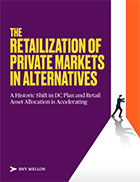Retail investors and defined contribution (DC) plans face a dilemma. Macroeconomic shocks, market volatility and rising interest rates have delivered historically low annual returns for public market equities and bonds. As a result, concerns are growing that traditional 60/40 portfolios can no longer deliver the diversification that investors require. One potential remedy lies in alternative market assets such as private equity, debt and real estate.
Ultra-high-net-worth individuals, institutional investors and defined benefit pension plans have consistently hiked their exposure to private markets as evidence of their outperformance has grown. Yet this fast-growing asset class has remained largely off limits to retail investors. Seemingly, regulators are focused on retail access with concerns about alternative assets’ complexity and potential risks. Certainly, alternative assets can be more complicated than traditional portfolios. But industry collaboration could overcome these challenges, unlocking retail access to private markets that could help future retirees better fund their retirement.
Our new whitepaper discusses the drivers of the democratization of alternatives and how the industry is responding.

FULL REPORT
Learn more about the retailization of alternatives in major markets and possible solutions to help bring the benefits of alternative investments to retail investors and DC plans.
The report’s findings include:
- The timing is right: Private markets’ assets of all types are being repriced due to valuation and liquidity concerns. But this could prove potentially advantageous for future returns. Moreover, certain experts believe including alternatives in portfolios could reduce overall volatility and enhance yield stability at a time of market challenges and lower return expectations for traditional asset classes.
- The industry is eager to engage: Private market managers are seeking a new growth engine as the defined benefit plans that have been a mainstay of investment in recent decades start to decline. Retail investors are a growing force and DC plans are now predominant in most countries, making these investors ideal new sources of investment.
- Tentative change is underway in major markets: Developments in the United States suggest attitudes to retail investment in alternatives are starting to change. In other markets, change is more concrete. Alternative asset managers are working on funds using structures such as SICAV and ELTIF in the European Union and LTAF in the United Kingdom.
- Some illiquidity is necessary and desirable: Retail investors and DC plans favor the daily liquidity offered by public asset markets; alternative asset managers need to acknowledge their expectations. But illiquidity is one of the reasons why alternative assets outperform public markets. Retail investors need access to education so they can understand both the opportunities associated with alternatives, as well as the tradeoffs. Existing measures to manage liquidity in other markets, such as REITs (where there are limits on redemptions), suggest compromises will be achievable.




